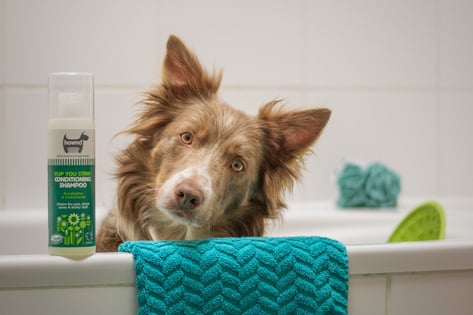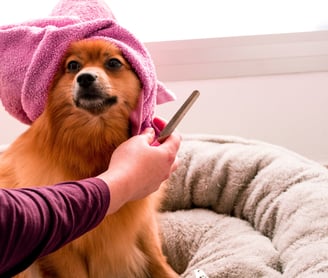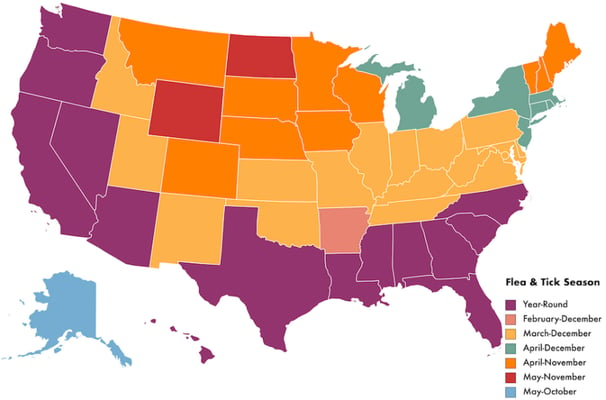Get Rid of Fleas on Your Furry Friends (A Veterinarian's Expert Picks)
Take control of the flea infestation on your furry friends using the expert picks from a veterinarian. Find effective and reliable solutions that have been recommended to provide lasting relief and protection for your pets.
DOG CARE PRODUCTS
danka
6/20/20237 min read
Pets can easily come into contact with fleas in their indoor and outdoor environments. These pesky parasites have a preference for cats and dogs, which means that that an infestation can unfold hastily. It's crucial to be vigilant and proactive in shielding your puppy, their dwelling vicinity, and your private home from fleas. Remember that flea infestations can occur swiftly, regularly earlier than you even recognise that your cat or canine has been affected. Stay alert and take preventative measures to preserve your bushy buddies safe and free from fleas.
Get Rid of Fleas on Dogs FAST
Flea bites may be top notch disturbing and make your hairy pal pass bonkers. But don't worry, there may be a brief restore! Capstar is the very best manner to kick the ones fleas to the diminish and get your canine (or cat) returned to their playful self in no time.
Additionally, it's critical to provide your dog with a gentle shampoo this is specifically designed to be safe for his or her eyes. This is due to the fact fleas now not most effective leave at the back of bothersome bites, but additionally lay eggs and depart traces in their waste, called flea dirt. Giving your puppy an intensive tub enables wash away those unwanted elements, presents alleviation from itching, and soothes any angry pores and skin they may have. It's a simple but effective way to make certain your pet's consolation and properly-being.
1. Wash your cat or dog
Any regular shampoo will suffice too, as fleas cannot survive in water. If your pet is experiencing discomfort from flea bites, consider using a soothing oatmeal formula for relief.
2. Wash all bedding
where your pet sleeps or where fleas have been spotted. No special soap is required; simply launder the bedding in your washing machine as usual.
3. Replace any filling
For dog or cat beds, it's best to replace the filling if possible. If not, it may be wise to invest in a new bed altogether. Flea eggs, larvae, and pupae can hide within the existing filling, so it's essential to eliminate them completely.
4. Vacuum. Every. Day
Be diligent about vacuuming every day. This simple act can help eliminate fleas in your carpet. Since flea eggs are not sticky, they can be easily sucked up by your vacuum cleaner. To enhance the effectiveness, consider sprinkling a mixture of DE (diatomaceous earth) and Borax into your vacuum bag or container. In extreme cases, you may opt for Sevin Dust.
5. Use a flea preventative
Use a reliable flea preventative on your pet. Combining these steps with the use of recommended flea pills or collars for at least three months will effectively resolve your flea problem.
Use Flea and Tick Shampoos for Effective Defense
As an Amazon Associate I earn from qualifying purchases.
One of the primary advantages of the use of flea and tick shampoos is their capacity to provide powerful pest manage. These especially formulated shampoos are designed to goal fleas and ticks without delay, removing them out of your pet's coat and preventing infestations. By washing your puppy with these shampoos often, you can help damage the flea and tick lifestyles cycle, reducing the hazard of reinfestation and maintaining your bushy friend itch-unfastened.


Addressing Flea Bites in Cats and Dogs
Typically, resolving the flea infestation will address the issue; however, some pets may experience significant irritation from flea bites.
To alleviate flea bites for your cat or dog, begin with a relaxing bathtub. Consider the usage of a mild soothing oatmeal shampoo or maybe moderate dish soap to provide comfort. It's vital to note that flea shampoos containing pesticides may not constantly efficaciously dispose of stay fleas, as I've encountered instances in which pets still had fleas no matter being washed with such products.
Topical cortisone ointments and sprays that comprise cortisone can offer remedy from flea bites too. However, it's essential to exercising caution whilst applying them. Avoid the usage of those merchandise at the face of your puppy and chorus from applying them in case your puppy is liable to licking or consuming the answer.
Preventing Fleas on Your Cat or Dog
When living in a flea-prone area, prevention becomes the optimal choice. Fleas are particularly active during the warmer seasons, but in certain regions of the United States, flea issues can persist throughout the year.
While it may be tempting to discontinue flea prevention during winter months, it's important to note that the majority of our country faces flea challenges for approximately 10-12 months annually, as indicated by the map below.
While natural methods can be effective in preventing fleas on your cat or dog, it's important to acknowledge that in areas with high flea activity, these methods may not be sufficient to fully address the issue.
If you or your pet are allergic to flea bites, there's no need to endure unnecessary discomfort by avoiding the use of pesticides for flea treatment. Responsible and targeted use of pesticides can greatly improve your health and overall quality of life.
Fortunately, there are numerous flea prevention options available for your beloved pet.
Use Flea-Repellent Bedding
Cedar and hemp are wonderful picks when it comes to bedding that repels fleas. These natural substances have a flea-repellent property, which could effectively lessen flea infestations for your pet's slumbering area. The strong scent of cedar and hemp is disliked with the aid of many pests, making them much less likely to inhabit the bedding and trouble your pets with fleas.
It's important to note that the effectiveness of cedar and hemp bedding might also decrease through the years, so it is really helpful to replace the bedding periodically to preserve its flea-repellent traits. For indoor pets, don't forget the usage of a mattress with a detachable and cleanable cowl, permitting you to without problems refresh the bedding as wished.
I have discovered a 33-pound bag of hemp bedding, which I use in my chicken coops. Additionally, cedar flakes can be easily found in both pet stores and online retailers.
Use Dried Herbs to Repel Fleas on Cats and Dogs
Sprinkling dried and ground herbs can provide an additional layer of protection against fleas. Here are some recommended herbs known for their flea-repellent properties:
Rosemary: This fragrant herb is not only a great addition to your culinary endeavors but also acts as a natural flea deterrent.
Lavender: Known for its soothing scent, lavender is a fantastic herb that can help keep fleas away from your pets.
Chamomile: Not only is chamomile calming, but it also serves as a natural repellent against fleas.
Catnip: While cats find catnip irresistible, fleas can't stand its presence. Sprinkling catnip around your pets can help repel these pesky pests.
Citronella: Known for its distinctive aroma, citronella is widely used in various insect-repelling products, including those designed to repel fleas.
By incorporating these dried herbs into your pet's environment, you can provide a natural and aromatic shield against fleas.
Using Essential Oils for Fleas on Cats and Dogs
While essential oils have the potential to repel fleas, it's crucial to exercise caution when using them around pets. Applying essential oils directly to your pets can be harmful if not done under veterinary supervision, as it's easy to overdo it and cause illness or even death.
To ensure the safety of your furry friends, I recommend using alternative methods. You can add a few drops of essential oil to a diffuser or sprinkle a few drops around their favorite lounging areas. This way, they can still benefit from the flea-repelling properties without direct contact or ingestion.
Here are some essential oils that are known for their flea-repelling properties:
When to See a Vet About Fleas
It is advisable to consult a veterinarian about fleas if you notice any of the following situations:
Severe infestation: If your pet is heavily infested with fleas, causing extreme discomfort, excessive scratching, and visible signs of irritation, it is recommended to seek veterinary assistance for prompt and effective treatment.
Allergic reactions: Some pets may have allergic reactions to flea bites, resulting in severe itching, skin inflammation, rashes, or even secondary infections. If your pet exhibits these symptoms, it's important to have them evaluated by a veterinarian for proper diagnosis and treatment.
Persistent flea problem: If you have been consistently treating your pet for fleas but continue to observe signs of infestation or recurring flea problems, it's advisable to consult a veterinarian. They can help determine the underlying cause and provide guidance on more effective flea control methods.
Young or senior pets: Puppies, kittens, and older pets may have weaker immune systems, making them more vulnerable to flea-related complications. If you have a young or senior pet and suspect a flea problem, it's best to consult a veterinarian for appropriate care.
Multiple pets in the household: If you have multiple pets and notice fleas on one of them, it's crucial to have all pets examined and treated as necessary. A veterinarian can assess the extent of infestation and provide guidance on treating and preventing fleas in a multi-pet household.


Remember, veterinarians are trained professionals who can provide personalized advice and recommend suitable flea control methods based on your pet's specific needs. If you have any concerns or questions about fleas and your pet's well-being, it's always recommended to consult a veterinarian for expert guidance.






